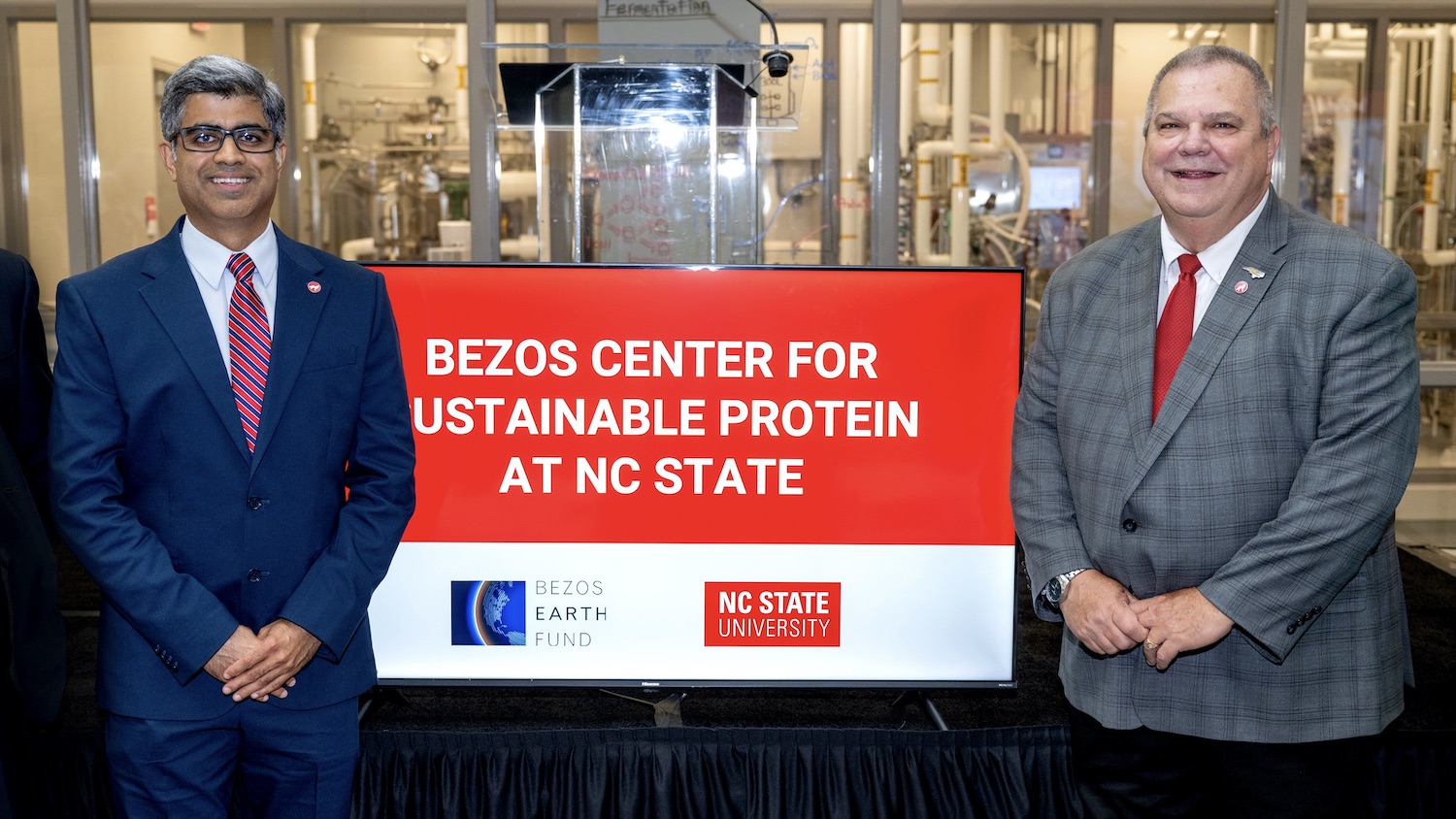Bezos Center Grows in First Year

Last May, the Bezos Center for Sustainable Protein at NC State was launched.
With a $30 million grant, NCFIL’s Dr. Bill Aimutis and NC State’s Dr. Rohan Shirwaiker solidified their partnership to lead it.
Fast forward to May 2025, and this talented duo is fulfilling their promise to transform the biomanufacturing of sustainable protein by focusing on the foundational pillars of research and development, workforce development and community engagement.
“If you only know one thing about the center, know this,” says Aimutis. “We are focused on providing food security for future generations and investigating the environmental impacts of protein production.”
Aimutis, who has been executive director of the NC Food Innovation Lab since inception, split his time between NCFIL and the Bezos Center for the past year.
Advancing Sustainable Protein
Aimutis and Shirwaiker have been working steadily toward advancing the goals of the center’s three foundational pillars: research and development, workforce development and community engagement.
The center’s overall goal is to transform biomanufacturing science and technology to accelerate the lab-to-table translation of tasty, nutritious and affordable plant-based, fermentation-made and cell-cultivated foods.
And they have made great strides in accomplishing some objectives as well as laying the groundwork for future realizations by utilizing a team science approach – one in which scientists, engineers, industry, nonprofits and stakeholders work collaboratively – to advance the sustainable protein sector.
Importance of Partnerships
The development of partnerships may be one of the most important growth aspects of the past year.
“When the Bezos Center was established, 25 industry companies engaged with our team and helped us identify early stages of our research and workforce development programs,” Aimutis says. “Since then, we have talked with over 50 companies globally.”
The partnership between NCFIL and the Bezos Center is also an important one. The center contracts with NCFIL for access to both its personnel and equipment.
“NCFIL works on projects addressing questions the Bezos Center seeks to answer, especially around plant protein processing and product development,” Aimutis says.
Pillar: Research & Development
Since the center’s launch, numerous efforts have been initiated and some achieved in terms of sustainable protein research and development.
First, a substantial key stakeholder study was conducted to capture an understanding of where the sustainable protein community believes the center should focus efforts.
Aimutis also reports the center conducted a large sensory analysis called “Drivers of Liking,” in which consumers’ opinions on market-available plant-based beef crumbles were secured.
Next, NCFIL Food Scientist Elise Parker is testing the texture and physical properties of the product. From this, the Bezos Center can investigate how the analytical data relates to the consumer’s preferences.
“We can take positive data from the analytical piece and correlate it to positive data from the consumer,” Aimutis says. “Then, we could conclude certain properties and components are important to making an ‘ideal product’ or a product the consumer will like when launched.”
These are only a sampling of many more efforts.
Pillar: Workforce Development
For workforce development, the Bezos Center is designing programs to further the sustainable protein education and training of K-12 to graduate students, postdocs, high school and community college instructors, Bezos Center faculty and industry practitioners.
Aimutis says their team is creating in-depth analysis of the skill sets needed for this sector’s future workforce. He and Shirwaiker are shepherding the next generation of food scientists.
“We just finished teaching the first sustainable protein biomanufacturing class at NC State,” Aimutis says. “We had 21 students, 10 graduate students and 11 undergraduates, and they are from at least 4 different majors. We invited industry subject matter experts and other Bezos Center faculty to speak with the students. The students also toured NCFIL.”
Aimutis foresees developing a whole curriculum focused on sustainable proteins in future years, which could result in a college minor or certification for professionals.
Another example of workforce development in action is the Good Food Institute (GFI) Alt Protein Project at NC State, a student club co-established with the Bezos Center. Shirwaiker serves as the club’s faculty advisor.
Pillar: Community Engagement
Looking at Aimutis’ and Shirwaiker’s calendars is easy proof of the massive amount of community engagement that transpired in the past year.
“We had sustainable protein-focused and Bezos Center-focused engagements with at least 250 practitioners from over 50 companies, nonprofits and government agencies, globally,” says Aimutis. “Specifically, we engaged the sustainable protein companies to discuss their technology, products and infrastructure.”
Community outreach did not stop there: the Bezos Center team co-organized sustainable protein community events, met with international delegations, visited the USDA Office of the Chief Scientist, engaged policy makers and traditional agriculture and commodity groups, and participated in several speaking engagements globally.
From Foundation to Fruition
Aimutis has seen the Bezos Center team significantly grow in the past year.
“We started with some 20 researchers across 5 universities,” says Aimutis. “Now, including undergrads, graduate students, postdocs and technicians, we have over 50 professionals involved in this effort that continues to grow.”
Bezos Center currently has several undergraduates conducting research in their labs, in addition to graduate students and postdocs.
“These undergraduate students are taking on more advanced projects than what was available years ago,” Aimutis says. “It is very encouraging to see this dedication, pursuit and tenacity so early in their careers.”
What happens now at the Bezos Center supports what will happen in its future.
“I am excited to see today’s groundwork come to fruition via the unique research projects, publications and technologies coming out,” he says. “We are doing the foundational work for what will happen three to five years down the road.”
- Categories: